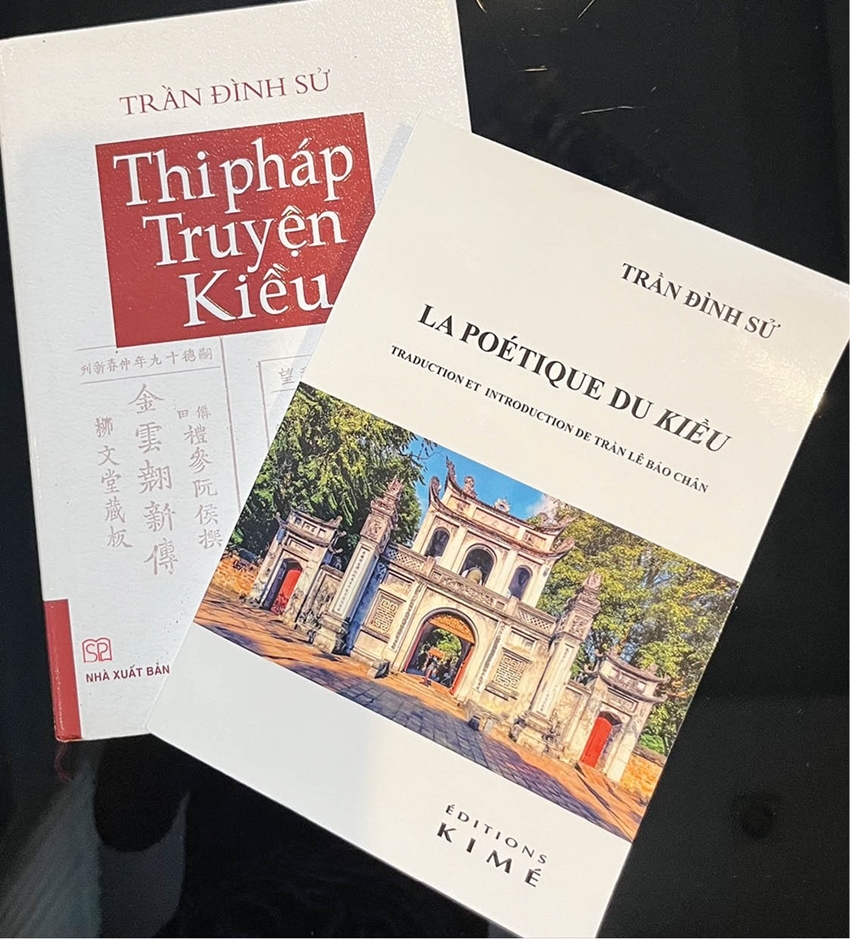 |
| Covers of the Vietnamese and French versions of “The Poetics of the Tale of Kiều” |
Thua Thien Hue Weekly respectfully presents to readers an introduction by Dr. Tran Le Bao Chan, a lecturer at Ho Chi Minh City University of Education - who translated “The Poetics of the Tale of Kiều” into French and is also the author of a chapter in this book.
The translation and publication of this work in France is the culmination of a multi-year scientific collaboration between the Hanoi National University of Education and the École Normale Supérieure in Paris. This project, which began in 2017 and continues to the present, has been spearheaded by Professor Michel Espagne of École Normale Supérieure.
“The Poetics of the Tale of Kiều” is a comprehensive literary analysis by Professor Tran Dinh Su, offering an in-depth and meticulous examination of Nguyen Du’s masterpiece, “The Tale of Kiều”.This work has been evaluated as a nationally prestigious academic publication studying the Kiều work.
The novelty of the Vietnamese version of this publication is that it showcases the author's incisive analytical style and, more significantly, employs a rigorous methodology to reach well-founded conclusions and insights. Professor Tran Dinh Su's work derives its scientific merit from a theoretical framework that synthesizes Western literary theories with an interdisciplinary research approach. This enables readers to explore The Tale of Kiều in a new way, from fresh, creative perspectives.
Tran Dinh Su, with his coherent thinking in comparative literature research and the acumen of a literary theorist, has conveyed a new vision as well as subtle discoveries and artistic worldview in the most classic literary work of Vietnamese literary history.
In “The Poetics of the Tale of Kiều,” Professor Tran Dinh Su pioneers the application of poetic theory to literary analysis in Vietnam, laying the foundation for a new school of poetic criticism in contemporary Vietnamese literature. Indeed, Tran Dinh Su’s “The Poetics of the Tale of Kiều” is the result of a process of contemplation and practice of poetics.
In this work, the author has focused on studying The Tale of Kiều from all artistic creative aspects of the work. From there, he points out the relationship of The Tale of Kiều with traditional national literary genres, clearly states the artistic worldview and creativity of Nguyen Du, identifies linguistic forms such as internal monologue, dialogue, allusions, metaphors, plot forms, narrative types... which are the components that create Nguyen Du’s poetics.
In addition to translating and conveying the content of six chapters from the original book published by the General Publishing House, this edition includes a 35-page Introduction written by translator Trần Lê Bảo Chân. This Introduction features an overview of Professor Tran Dinh Su and his distinguished career in literary research and criticism. It also serves to acquaint French readers with Nguyen Du and the Tale of Kiều.
Chapter 1: Reviewing main methods in studying the poetry of the Tale of Kiều.
Chapter 2: Presenting a comparative study between the Tale of Kiều and Chinese novels, and the interaction between Vietnamese and Chinese literature.
Chapter 3: Analyzing the intertextuality between Nôm poetry and the Tale of Kiều, to clarify the reception of Vietnamese cultural and literary influences, especially the relationship between literary genres and the plot of Vietnamese works.
Chapter 4: Studying the artistic world forming contemporary research trends in studying the Tale of Kiều.
Chapter 5: Studying the narrative in the Tale of Kiều, thereby highlighting the characteristics and uniqueness of the work’s poetic writing style.
Chapter 6: Examining the rhetorical devices of the work to study the style, tone, nuances, duality, and binary nature in the narrative.
Book information in France and European countries:
The Poetics of Kiều
Tran Dinh Su
Translation and introduction by Tran Le Bao Chan
Publisher: Editions Kimé
Collection / Series: Détours littéraires
